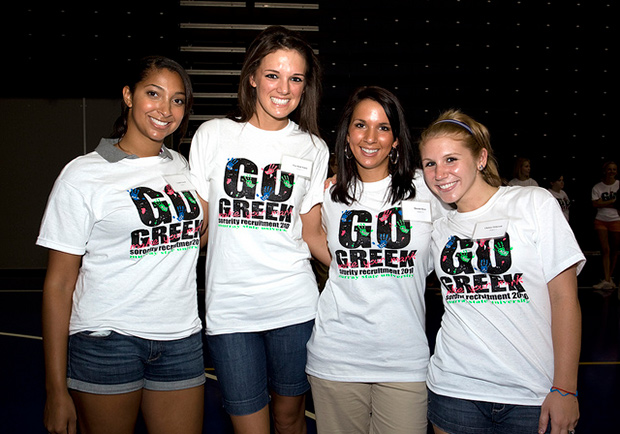People are surprised when I admit that I belonged in a sorority in college. I wore the T-shirts, sang the songs, learned the handshake, went to the parties… the whole thing. Sororities have such a negative stereotype that it's hard for some to imagine a nice, smart, normal person joining a sorority.
The very worst of such stereotypes were laid out in a profanity-filled, CAPS LOCK-ENGAGED sorority e-mail-gone-viral last month. This tirade from a member to her "f—ing awkward" and anti-social chapter became fodder for Gawker, Buzzfeed, Funny or Die, and the rest of the easily amused Internet. (Fair warning: Those links contain lots of offensive language.) The context of the e-mail isn't the real draw—the social standing of Delta Gamma at the University of Maryland doesn't quite merit national concern and the sender has since resigned. Instead, it's her tone that catches our attention. Catty. Demanding. Mean.
Most of us probably haven't gotten an e-mail with 41 instances of the F-word. But we still know what it's like to deal with a mean girl in our midst. That's not just a sorority thing. When women gather together, despite the opportunities to build each other up and support one another, a mean girl mentality can emerge. It's conflict, negative energy, competitive spirit, drama … whatever you want to call it. But why does it happen? Why do women turn on each other?
At nearly every stage in our lives, we can join girls-only groups, from Girl Scouts to Bunko leagues, sororities to ladies' Bible studies. Women are wired for friendship and seek out social circles among other women. Researchers found this trait roots into the core of our being, that psychologically women don't only have a "fight or flight" mentality, but also a "tend and befriend" response. We instinctually turn to friends for stress relief and safety. (Yay besties!) Guys certainly also need friends and rely on them for support, belonging, and hanging out, but we women more proactively seek out new relationships, particularly in social and group structures.
Many of our most meaningful friendships emerge out of shared experience, time, intimacy, and investment. We work to develop strong bonds and build trust. But sometimes we find ourselves thrown into groups of women where it feels like some of the work has already been done for us. Even if we've just met, we already share a collective identity and have something in common. In a sorority, this happens quickly and outwardly. A stranger wearing my Greek letters becomes an instant friend, someone I can wave to on campus and sit next to in class.
In large groups of women, these kinds of friends can be easy to make. We meet people who will chat with us about Mad Men, meet us at Starbucks, share a pew with us at church, and forward e-mails about the sale at Banana Republic. Women's social organizations provide a place where we can meet people to satisfy this basic need to tend and befriend. But they often don't encourage us to go deeper—even in the church. Groups can foster the appearance of true friendship—slapping on the label "sisterhood"—but we're really just ladies hanging out and wearing matching T-shirts. If it looks enough like friendship, it'll do.
Over time, more authentic relationships can emerge out of these groups. (Some of my closest friends started off as my sorority sisters, but we grew a deeper connection over the years, particularly after college.) Still, sometimes we settle for less, for barely there friendships where we don't really know, respect, or care for other women.
Sure, we can point to bullying, aggression, and power trips as reasons that grown women turn into mean girls, but ultimately, I think our shallow relationships are to blame. Angry rants, backstabbing, and jealousy breed in circles where we don't care about the people our words may hurt. When women aren't really our friends, they can easily become our competition, the butt of our jokes, or our frenemies. Large groups also offer a range of targets and sub-cliques, plenty of people to gossip about and gossip with. Even in Christian women's circles, we can go straight from discussing a sermon to bringing up backhanded insults disguised as prayer requests. It's not pretty.
It's also not good for us as women, who should be there for each other and use group settings for our mutual benefit. Our behavior is ruining the word "girl," taking away all the fun and strength of "girl power," for what's become our catty "girly girl" nonsense: sorority girls, mean girls, gossip girls. We need to use our words for good, to forge real relationships or to maintain at least civil ones.
This sounds really Pollyanna, I know. We can't all be friends, and even close friends still hurt each others' feelings. There will always be mean girls. The lesson, though, is to be intentional in the ways we build friendships, particularly in organizational settings. Ultimately, our gatherings—even as Christian women—may provide a label, but the relationships of the people within the group matter more than the organization itself.
Invest regularly, generously, and deliberately in close friends, and don't let shallow friendships become so shallow that we no longer respect others. Proverbs advises us on building healthy(18:24), loving (17:17), reliable (20:6) friendships. The New Testament is full of directives on how we relate to one another. Ultimately, these verses serve as a solid reminder to tone down the drama. Maybe that's why even my sorority's weekly ritual included reciting them out loud, together.









